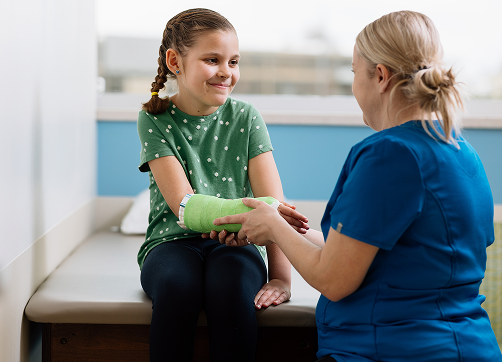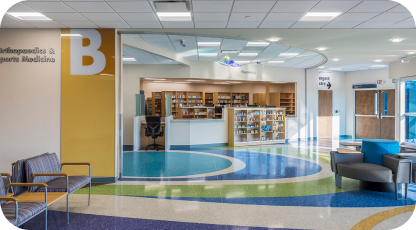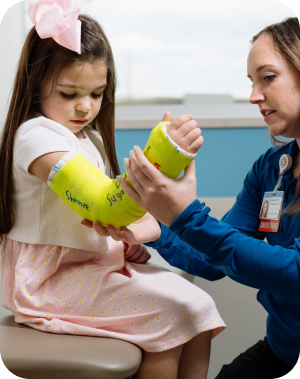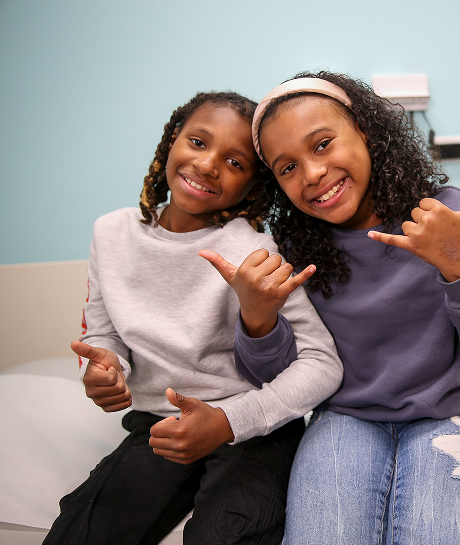diabetes
At Dayton Children’s Hospital, we offer comprehensive, multidisciplinary care for children with type 1 and type 2 diabetes.


comprehensive, multidisciplinary care for patients with type 1 and type 2 diabetes
Dayton Children’s Hospital provides comprehensive, multidisciplinary care for patients with type 1 and type 2 diabetes. Our goal is for our patients to live normal, active lives.
The diabetes team is led by our endocrinologists, and includes nurses, dietitians, a social worker and a psychologist. They take a personal approach with patients and families, always making time to provide education and support. The team includes nurses who are certified diabetes educators. This means they have gone through intensive training to teach people with diabetes how to manage their condition. Our program is recognized by the American Diabetes Association, showing our passion and commitment to providing high quality education.
personalized support and transition to adulthood
Our goal is to help children take responsibility for managing their health. We work with families to create a personalized care plan and review it regularly as the child’s needs change. Our team cares for patients as they transition into adulthood, usually around the age of 22.
Patients and families appreciate our thorough and personal approach, knowing that they can contact us by phone or email with questions or concerns. They can also communicate with our team through MyKidsChart.
conditions
Dayton Children’s provides expert care for patients with type 1 and type 2 diabetes as well as caring for children with cystic fibrosis-related diabetes. These diseases are very different from one another, and they require different kinds of care.
type 1 diabetes
Type 1 diabetes can develop quickly, taking patients and parents by surprise. It occurs when the body’s immune system destroys cells in the pancreas that produce the hormone called insulin.
Insulin is essential in helping the body convert sugar (called glucose) into energy. After a person eats, the digestive system breaks down carbohydrates to create glucose. Insulin moves glucose into the body’s cells. Without it, glucose builds up in the blood instead. This can lead to dehydration, weight loss and a life-threatening condition called diabetic ketoacidosis, or DKA. DKA occurs when the body starts breaking down fat cells in a desperate attempt to get energy.
diagnosing type 1 diabetes
Most of the time, children are diagnosed with type 1 diabetes after a parent, caregiver or teacher notices symptoms such as excessive thirst, frequent urination, weight loss, nausea and vomiting, and fatigue. Doctors can confirm a diagnosis of type 1 diabetes using a urine test and/or blood test.
There is no cure for this disease. But children with type 1 diabetes can live full and active lives with the help of intensive insulin therapy, which involves administering shots or using an insulin pump to deliver insulin several times a day.
Adjusting to Type 1 diabetes can be challenging, but our caring team can help you and your child be successful.
type 2 diabetes
Type 2 diabetes occurs when cells in a child’s body become resistant to insulin, causing glucose to build up in the bloodstream. Over years, this build-up can reach dangerous levels and lead to complications such as heart disease, blindness and kidney failure.
Type 2 diabetes is almost always preventable. The single greatest risk factor is excess weight, although family history can play a role. Your child’s primary care physician can help you understand your child’s risk factors and work to reduce them through diet and exercise. Once a child has been diagnosed with type 2 diabetes, a healthy diet, exercise, insulin and (in some cases) oral medication can help them manage it.
diagnosing type 2 diabetes
The symptoms of type 2 diabetes in children develop slowly. They include unexplained weight loss, increased hunger or thirst, and frequent urination and fatigue, among others. If you notice these symptoms in your child, take him or her to the doctor as soon as possible. A urine and/or blood test can help determine if your child has a form of diabetes. If your child is overweight, the doctor may need time to determine whether the cause is type 1 or type 2 diabetes.
cystic fibrosis-related diabetes
Cystic fibrosis-related diabetes (CFRD) is a unique form of diabetes that is common in people with cystic fibrosis. Our endocrinologists would work closely with the child’s pulmonary team to manage this additional disease caused by their CF. CFRD shares features of both type 1 and type 2 diabetes. It is recommended that any child with CF age 10 and older be tested every year for CFRD.
Learn more about CFRD from the Cystic Fibrosis Foundation.

forms
As a patient of the endocrinology department at Dayton Children’s you may find the following forms helpful:
You can also visit our forms page for additional forms such as release of information to schools and consent to treat form.


diabetes resource center
If you are currently a patient of the endocrinology diabetes clinic at Dayton Children’s please visit our diabetes resource center for additional forms and resources to help you manage your care.
video visits
Current patients in the diabetes clinic need to be seen in-person a minimum of once per year. This will allow your care team to check your height, weight and perform a neuropathy test. In addition to your annual in-person visit, most insurance companies will cover up to three video visits per year. Video visits provide a convenient opportunity to ask questions, address your prescriptions and discuss your diabetes management with your care team. For a successful video visit, lab work will need to be performed three days before your appointment and patients are encouraged to download any pump or meter data the day before their appointment. To schedule a video visit with the Dayton Children’s endocrinology team, please call the clinic at 937-641-3487.
contact us
The endocrinology department welcomes phone calls to 937-641-3487 during our normal business hours of 8:00 am to 5:00 pm. After hours, you can dial 937-641-3000 and ask that the endocrinologist on call be paged.
schedule an appointment
Schedule you appointment online by visiting our scheduling page. All follow up appointments will be made during your clinic visit or by calling central scheduling at 937-641-4000.
here when you need us
Whether you’re looking for the right provider, ready to make an appointment, or need care right now—we’re here to help you take the next step with confidence.
